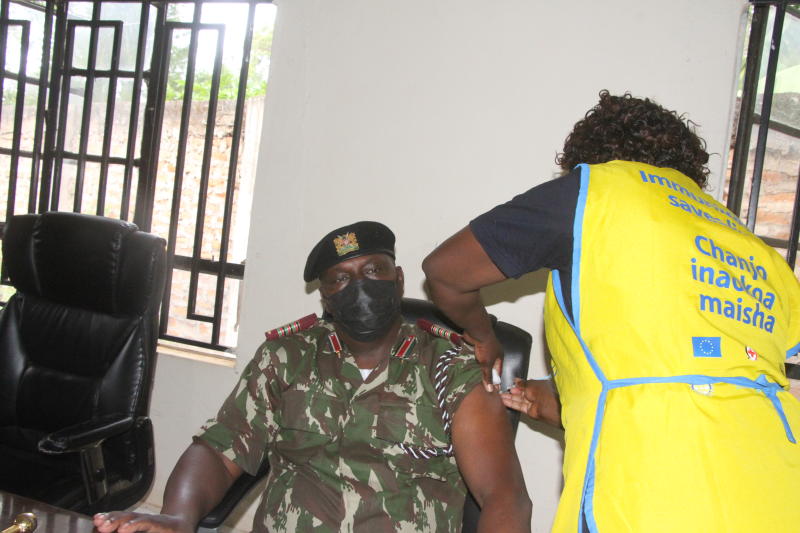
Migori Commissioner Mr. Meru Mwangi gets COVID-19 booster shot during the launch of the Mass Vaccination drive in Migori County on February 3, 2022. [Caleb Kingwara, Standard]
The Australian Technical Advisory Group on Immunisation recommends Australians aged 16 and older have a Covid booster vaccine three months after receiving their second dose.
You now need a third dose to be considered “up to date” with Covid vaccination, previously known as “fully vaccinated”.
Despite this, only about half of the eligible population has received a booster dose.
Here we answer some of your Covid booster vaccine questions.
Why have a booster?
There’s still widespread community transmission of the Omicron variant across Australia and the world.
The protection provided by two doses of a Covid vaccine is reduced and more rapidly wanes against Omicron.
Despite this, many eligible Australians aren’t coming forward for their booster, perhaps reassured by reports that Omicron is milder, so therefore not something to be worried about.
There’s now clear evidence getting your booster shot is the best way to restore protection against infection and severe disease.
Having a booster three months following the primary course can provide similar levels of protection against Omicron as the two primary doses did for Delta.
Which booster can I have?
Australians over 16 can now have Pfizer or Moderna as a booster, regardless of which vaccines you had for the first two.
Pfizer’s is a full dose just like the first two, while Moderna’s booster dose is half the dose of the primary vaccine.
AstraZeneca has been approved as a booster dose, but Pfizer and Moderna remain preferred, except in a small number people who have had a significant adverse reaction to mRNA vaccines.
Novavax, the new protein-based vaccine, is currently only approved for use in the first two doses. Despite encouraging evidence from clinical trials, it’s not currently approved as a booster.
Boosters aren’t yet recommended in younger adolescents (less than 16 years old) and children.
What side effects should I expect?
AusVaxSafety, Australia’s national active vaccine safety surveillance system, found Australians who’ve already had their booster vaccine reported similar side effects as they did after their second dose, for both Pfizer and Moderna boosters.
The most common side effect following booster vaccines was a local reaction (including pain, redness, swelling and itching over the injection site), followed by fatigue, headache and muscle or joint pain.
Less than one per cent of people reported needing to see a doctor as a result of their side effects.
Fewer also reported needing to miss work, study or their routine duties as a result of booster vaccine side effects compared to their second dose, suggesting they were manageable.
It’s not uncommon to experience swollen lymph nodes, often in the armpit on the same side as the vaccination shot. This normally occurs within a few days of vaccination and resolves within a week or so without treatment.
Swollen lymph nodes are more common following booster vaccines, with up to 5 per cent of people reporting this following a Pfizer booster, compared to less than 1 per cent of people following dose one or dose two. Swollen lymph nodes were experienced in up to 10 per cent of people following Moderna boosters.
We don’t know why some people experience side effects such as swollen lymph nodes, and others don’t.
What about more serious adverse events?
There’s a small increased risk of heart inflammation (pericarditis and/or myocarditis) in people who have received an mRN vaccine (including Pfizer and Moderna), compared to unvaccinated people.
However, Covid infection is associated with a substantially higher risk of myocarditis, and other cardiac complications, compared to a Covid vaccination.
As of February 13, approximately 10 million third doses have been administered in Australia. Only six reports of likely myocarditis and 25 reports of likely pericarditis have been reported to the TGA for Pfizer, and four reports of likely myocarditis and eight reports of likely pericarditis for Moderna.
Data from Israel and US are also reassuring, finding lower rates of myocarditis and pericarditis following a third dose compared to a second dose of mRNA vaccines.
What if you’ve recently had Covid infection?
As with vaccination, immunity following Covid infection wanes over time.
That’s why, even if you get Covid, we still recommend you get your next dose to ensure you get the best protection.
You can get vaccinated as soon as you’ve recovered from your Covid infection.
Having Covid will provide some immunity against reinfection, so you can defer vaccination for up to four months after the start of your infection.
If you’ve received antibody medication or convalescent plasma as part of your treatment for Covid, you should defer future vaccine doses for at least three months after infection.
Will we need more doses in the future?
A report published by the US Centres for Disease Control and Prevention (CDC) in February found protection was starting to wane from four months after the third dose.
But it’s too early to tell if further booster vaccines are required in the future.
Whether having a single booster is enough to protect ourselves against future infections is still uncertain at this stage, but scientists, health professionals and policy makers are watching these data very closely.
Ahead of these data, it’s more important than ever to get that booster dose as soon as you’re eligible.
 The Standard Group Plc is a multi-media organization with investments in media
platforms spanning newspaper print
operations, television, radio broadcasting, digital and online services. The
Standard Group is recognized as a
leading multi-media house in Kenya with a key influence in matters of national
and international interest.
The Standard Group Plc is a multi-media organization with investments in media
platforms spanning newspaper print
operations, television, radio broadcasting, digital and online services. The
Standard Group is recognized as a
leading multi-media house in Kenya with a key influence in matters of national
and international interest.











